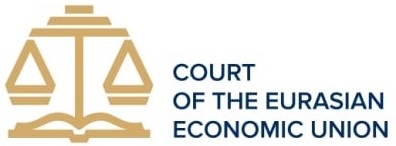
Jurisdiction: Disputes
The jurisdiction of the Court is laid down in the Statute of the Court.
Applications to resolve a dispute may be submitted to the Court by Member States and economic entities.
Applicant: State
A Member State may apply to the Court with the following application:
- concerning the compliance of an international treaty within the Union or its particular provisions with the Treaty;
- contesting the observance by another Member State (other Member States) of the Treaty, international treaties within the Union and/or decisions of the bodies of the Union, as well as particular provisions of the said international treaties and/or decisions;
- concerning the compliance of a decision of the Eurasian Economic Commission or its particular provisions with the Treaty, international treaties within the Union and/or decisions of the bodies of the Union;
- challenging actions (failure to act) of the Eurasian Economic Commission.
Applicant: Economic Entity
An economic entity is entitled to contest the compliance of decisions (or its particular provisions) and actions (failure to act) of the Eurasian Economic Commission with the Treaty and/or international treaties within the Union. However, not any decision can be contested before the Court, but only those of them directly affecting the rights and legitimate interests of the economic entity in the area of business and other economic activities, provided the contested decision, action or failure to act entailed a violation of any rights and legitimate interests of the economic entity granted by the Treaty or international treaties within the Union.
In accordance with Paragraph 39 of the Statute of the Court an economic entity is defined as a legal person registered in accordance with the legislation of a Member State or a third State or a natural person registered as an individual entrepreneur in accordance with the legislation of a Member State or a third State. Therefore, economic entities registered in the states, which are not members of the Union, also have the right to apply to the Court of the Union.
A judgment of the Chamber of the Court is binding and enters into force after 15 calendar days from the date of its delivery, if it was not appealed to the Appeals Chamber of the Court.
A judgment of the Appeals Chamber of the Court enters into force from the date of its delivery, is final and without appeal.
Jurisdiction: Clarification
Besides the jurisdiction to resolve disputes, the Court also has the jurisdiction to provide clarification of provisions of law of the Union at the request of a Member State or a body of the Union or at the request of employees and officials of the bodies of the Union regarding labour relations.
The Court may clarify provisions of international treaty of the EAEU with third party, if it is provided by such treaty.
The Member States may attribute to the competence of the Court other disputes, resolution of which by the Court is expressly provided by the Treaty, international treaties within the EAEU, international treaties of the EAEU with any third party or other international treaties of Member States.
A mandatory pretrial dispute resolution procedure is prescribed for Member States and economic entities before submitting applications.
According to the Decision of the Supreme Eurasian Economic Council from December 10, 2021 No. 24, in 2022 the amount of the fee paid by economic entities when applying to the Court is equal to 49,760 thousand Russian rubles.
Procedure
The judicial procedure before the Court is laid down in the Statute of the Court and in the Rules of Procedure of the Court of the Eurasian Economic Union, approved by the Decision of the Supreme Eurasian Economic Council at the level of Heads of States of December 23, 2014 № 101.
The judicial proceedings are carried out in Russian. An application and all attached documents must be submitted to the Court in Russian or with attachment of their certified translation into Russian.
The dispute resolution proceedings comprise two parts: a written part and an oral one.
- The written procedure consists of filing an application to the Court, submission of other documents and materials related to the dispute or their certified copies, the report of a specialised group (in case of creation of such a group).
- The oral procedure consists of the report of the judge-rapporteur, hearing of persons participating in the dispute, the reports of experts and specialists, as well as the announcement of documents and materials, orders of the Court and judgments of the Court. Within 90 days of the date of receipt of an application, having considered the dispute, the Court delivers a judgment or, in case of a request for clarification – provides an advisory opinion.
The Rules of Procedure of the Court establish a number of mandatory requirements for the application of an economic entity to resolve a dispute, and for an appeal against a judgment of the Chamber of the Court. These requirements are laid down in Articles 9 and 62-63 of the Rules of Procedure of the Court (the text is posted on the main page of this website).
After the consideration of disputes initiated by Member States the Court delivers a judgment that shall be obligatory for execution by the parties to the dispute. After the consideration of disputes initiated by economic entities the Court delivers a judgment that shall be obligatory for execution by the Eurasian Economic Commission. If the Commission’s decision or its certain provisions are being recognized by the Court as not complying with the Treaty and (or) international treaties within the EAEU, the Commission should bring it into compliance within the reasonable term, but not exceeding 60 calendar days from the moment of entry into force of the Court’s judgment, unless any other term is established in the judgment of the Court.
 Astana
Astana  Minsk
Minsk 